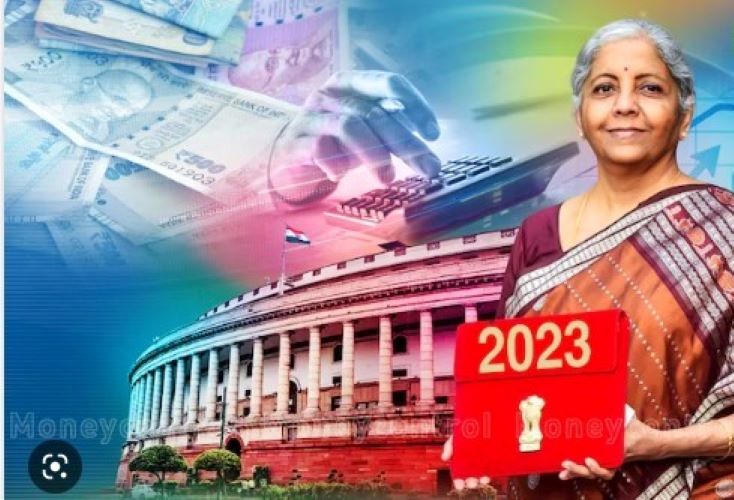Union Budget 2023-24 Different industries, similar hopes

Team L&M
We spoke to stakeholders from different businesses across several industries bout their expectations from the forthcoming Union Budget, and came to know that each one has high expectations from the government. What is more heartening is that they repose a lot of trust in the government ability to do that.
Ramesh Kalyanaraman, Executive Director, Kalyan Jewellers.
The jewellery industry in India has the potential to be a major driver of economic growth; the sector benefits from a large and vibrant market driven by strong domestic consumption as well as seasonal demand from the visiting Indian diaspora. With evolving consumer preferences as well as introduction of various regulations such as GST implementation and mandatory hallmarking, there has been rapid formalization in India’s jewellery industry. As we look forward to the Union Budget 2023-24, we have a huge opportunity to unlock the true potential of India’s jewellery sector and develop it to become a global leader and trade centre. We believe, with the right policies and support from the Government of India, we can further encourage the industry to become more organised. As an entity built on the principles of trust and transparency, it gives us immense pride to see widespread acceptance of fair trade practices such as BIS hallmarking, which has eventually empowered consumers across markets. With major infrastructural investments such as the launch of a new jewellery park in Navi Mumbai and expansion of manufacturing facilities in Surat, we are driven towards improving efficiency and bringing in innovation across the sector, through various pioneering initiatives. The formulation of an effective regulatory framework can further boost digitisation in the sector that will eventually increase transparency and accountability.
Mohit Rathod, Co-Founder, Truly Desi
The price of animal fodder has been increasing since a year, which has impacted the input costs of cattle right from small households running cattle to big dairy farms. This has led to the inflation of milk and milk products. Being a brand that works ethically on end-to-end processes of all our products makes it even harder when it comes to cost-cutting or applying alternatives. And hence we look forward to fair and considerate inputs to help us be a boon to this society.
Samarth Kholkar, CEO & Co-Founder, BLive, EV Sector

Arjun Sinha Roy, Co-Founder, iRasus Technologies
2022 has seen a rise in EV sales, especially EV two-wheelers, which has seen a whopping rise of 300 per cent compared to the previous year (2021). This shows not only will the EV market grow in the country if it gets the right push, but India also has the potential to be a global pioneer in this sector. The key focus of the EV industry should now be on building scale and capacity. Some sectors that need support and push from the Government are the Batteries (both hardware and software), OEM, and Charging Infrastructure. The Union Budget 2023-24 should focus on ease of business and encourage more local players to enter the market. Areas like component localisation, access to components, etc, if addressed, can help Indian companies build competitive products at competitive prices.
Nishan Singh Bajwa, Director, Remax Buildcon & Solar Energy
2023 could be a significant year for the renewable energy industry, especially the solar sector. The Indian government has shown a commitment to supporting the growth of the renewable energy sector and has implemented several policies and initiatives to encourage its expansion. It is important for the government to continue this trend in the upcoming budget and with the right support from the government, the renewable energy sector has the potential to expand at a much faster pace and contribute significantly to the
country’s energy mix. By making strategic investments in this sector, the government can help to secure a more sustainable
and environmentally-friendly energy future for the country.
Ankit Alok Bagaria, Co-Founder, Loopworm|
The Union Budget 2023-24 must attempt to positively transform the agriculture and biotechnology sectors in India from a differentiated lens. When it comes to the agriculture sector in India, we have seen in the previous years that most of the time the budgetary money allocated goes into various subsidies or loans. While loans and subsidies are important for agri-stakeholders, the grant money to scale up innovative ideas to PoC to pilots to commercialization is minimal. On the other hand, the Indian biotechnology space also faces a similar dilemma. In the previous year’s Budget, a significantly large part of the allocated amount that went to the Department of Biotechnology was spent on autonomous bodies and institutes focussing on biotech research; however, support provided in terms of commercialization to start-ups or corporates remained limited. Thus, in the upcoming Budget we would be happy if more focus and support is extebded to commercialization of biotechnology companies or start-ups. Given that biotech machinery and equipment is quite expensive, financial support in the form of loans and subsidies could help a lot in accelerating commercialization and scale up On the other hand, when it comes to agri-allied or agri-tech innovations and startups, we expect the Budget to make scale-up grants available as well, independent of whether or not any start-up has availed a smaller grant previously. If the start-up is ready, they should be helped with the money to scale up. The Budget should also promote precision agriculture and unconventional forms of agriculture such as Algae farming, insect farming.
Abhishek Jain, Fellow & Director, Powering Livelihoods, Council on Energy, Environment and Water (CEEW)
In 2022, the government released a dedicated policy framework to promote Decentralised Renewable Energy applications for livelihoods. We hope that this significant example of pursuing the trifecta of jobs, growth and sustainability, would find fiscal allocations in the Union Budget 2023-24 to start realising the vision of the policy framework.
Dr Deepak Birewar, Chairman & MD, Inventys Research Company
We expect positive momentum towards formulation of the PLI scheme for the chemical sector to encourage domestic manufacturing. With exports of chemical and petroleum products to more than 175 countries standing at a staggering $8.24 billion, we expect the government to implement export benefits for specialty chemicals to aid the overall economy. Manufacturing business tax exemptions provided by DSIR, under section 35 (2AB) of the IT Act 1961, stands at 100 per cent compared to the 150 per cent prior to March 2020. A revision in this tax structure could empower firms to increase R&D expenditure, helping them produce new products and technologies. Additionally, the government can create a Models Specialty Chemical Manufacturing Region in Vidarbha, which could give rise to 3000 MSMEs in the region, with a petrochemical complex acting as a catalyst for industrial growth. The chemical sector is highly capital intensive with long pay back periods. Capital expansion of the chemical sector could be enabled if the government provides subsidies of 10-20 per cent for investment projects beyond Rs 100 crore. In the past months, the shift of global supply from China has increased outsourcing opportunities and domestic demand. It has given India more expansion opportunities. By 2025, the Indian
chemical industry is expected to reach US $300 billion, and focused assistance in export benefits, tax advantages,
and capital subsidies will further add thrust to the ongoing growth.
Aditya Munjal, Director, Hero Cycles
While the world continues to see the gaining importance for bicycles as a sector, with Europe holding more than 50 per cent of the total global e-cycle market. Increasingly, Indians are beginning to understand the value proposition of cycles and e-cycles and are willing to switch from their existing modes of commute. This is a positive sign for the sector given that around 20 Mn bicycles are made and sold in the country. We hope the Union Budget 2023-24 will include cycles and e-cycles in the existing schemes and policies such as PLI and FAME-II, that would help transform the bicycle industry in the country. There is a huge potential within India for the cycling industry and by taking adequate measures such as providing subsidies and lowering interest rates on the purchase of an e-cycle would help in increasing adoption, contributing to the socio-economic needs of the consumer. As a nation, we are already one of the largest
push-cycle makers in the world, having the capacity, talent, and intention to exponentially increase manufacturing,
by making globally competitive and technologically advanced e-cycles. With severe supply chain disruptions globally; this is our opportunity to take the pole position in supplying e-cycles to the world.”
Dhuwarakha Sriram, Chief of Generation Unlimited (YuWaah) and Youth Development and Partnerships at UNICEF
The much-talked-about demographic dividend of India, with over 350 million young people, requires concerted efforts by all stakeholders toward realizing the potential of young people. The government, private sector, UN agencies, and civil society have been working on varied initiatives for young people. A transformative example is the National Education Policy, which is the right step in this direction. We need to continue to systematically work together to maximize the impact of our initiatives and build Public-Private-Youth Partnerships, with young people at the center. With the upcoming Budget, we are hopeful that substantial focus and resources will continue to be channelled toward young people’s needs and aspirations. In the long term, these investments and efforts will yield results for young people and India. This will be a step forward towards achieving the vision of the National Youth Policy as well as the Sustainable Development Goals, while ensuring young people are able to make the most of the opportunities generated in the process.
Arpita Katyal, CEO, Roperro, a Made in India fashion label
We expect Government to provide incentive to home grown manufactures who are competing with global fashion and retail giants. India is a huge market for retail and local online marketplaces such as ours must have a level playing field to compete with large multinational operators. As per estimates Indian retail market is expected to be a USD 1.5 trillion segment by 2030, up from USD 0.793 trillion in 2020 given the growing levels of income and rapid urbanization – our mini metros and tier 2 towns are the real growth drivers.
Local manufacturers are well poised to leverage this big opportunity and the Union Budget of 2023 must support indigenous entrepreneurship and local efforts.
Vikram Agarwal, Managing Director, Greendot Health Foods Pvt. Ltd
This fiscal year we would like the budget to enhance food sector competitiveness in the International market. The Government should provide a budget for export incentive schemes to the food sector and a subsidy for overseas participation in major food shows.
Uttam Malani, Executive Director, Centuary Mattress
2023 Union Budget comes at a time of heightened global uncertainty and fear of economic downturn across most major economies. The push towards exports may see a temporary slowdown, and economic growth may rely more on domestic consumption. Hence, the tax policies may need to be more inclusive, leaving higher disposable income in the hands of a larger base of the population.
Managing inflation adequately should continue to be foremost in the mind of our FM, who will need to walk a tightrope between growth & inflation pressures. On the corporate side, the budget should continue to prioritise capital deployment & infrastructure creation by encouraging/incentivising private sector investments; which will help in job creation while also strengthening India’s long term growth prospects. Simplification & ease of compliance (particularly with the GST regime settling in) should be another priority for this budget.













